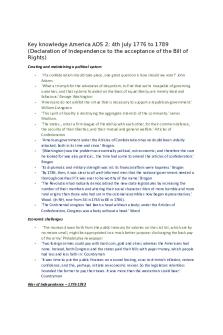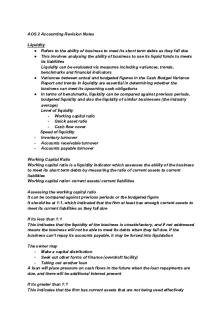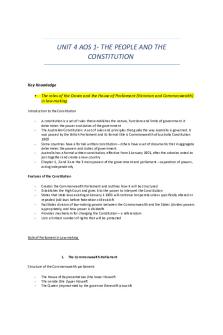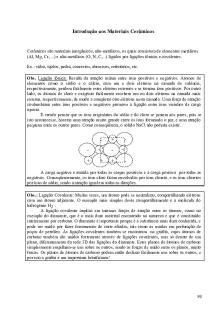America AOS 2 key knowledge PDF

| Title | America AOS 2 key knowledge |
|---|---|
| Author | Margaret Nicholas |
| Course | History: Revolutions |
| Institution | Victorian Certificate of Education |
| Pages | 13 |
| File Size | 268.4 KB |
| File Type | |
| Total Downloads | 32 |
| Total Views | 163 |
Summary
Quotes for each point on the AOS2 America study design - primary and historical interpretations...
Description
Key knowledge America AOS 2: 4th July 1776 to 1789 (Declaration of Independence to the acceptance of the Bill of Rights) Creating and maintaining a political system -
-
-
-
-
‘If a confederation should take place, one great question is how should we vote?’ John Adams ‘What a triumph for the advocates of despotism, to find that we’re incapable of governing ourselves, and that systems founded on the basis of equal liberty, are merely ideal and fallacious.’ George Washington ‘Americans do not exhibit the virtue that is necessary to support a republican government.’ William Livingston ‘This spirit of locality is destroying the aggregate interests of the community.’ James Madison. ‘The states… enter a firm league of friendship with each other, for their common defence, the security of their liberties, and their mutual and general welfare.’ Articles of Confederation ‘American government under the Articles of Confederation has no doubt been unfairly attacked, both in its time and since.’ Brogan. ‘(Washington) saw the problem as essentially political, not economic; and therefore the cure he looked for was also political… the time had come to amend the articles of confederation.’ Brogan ‘Its diplomatic and military strength was nil; its financial affairs were hopeless.’ Brogan ‘By 1786, then, it was clear to all well-informed men that the national government needed a thorough overhaul if it was ever to be worthy of the name.’ Brogan ‘The Revolution had radically democratised the new state legislatures by increasing the number of their members and altering their social character. Men of more humble and more rural origins than those who had sat in the colonial assemblies now began representatives.’ Wood. (In NH, rose from 34 in 1765 to 88 in 1786). ‘The Continental congress had been a head without a body; under the Articles of Confederation, Congress was a body without a head.’ Wood
Economic challenges -
-
-
‘The moneys drawn forth from the public treasury for salaries on the civil list, which are by no means small, might be appropriated to a much better purpose: discharging the back pay of the army.’ Philadelphia newspaper ‘Two foreign armies could pay with hard coin, gold and silver, whereas the Americans had none. Instead, both Congress and the states paid their bills with paper money, which people had less and less faith in.’ Countryman ‘It was time to put the public finances on a sound footing, so as to diminish inflation, restore confidence, and this, perhaps, initiate an economic revival. So the legislators relentless hounded the farmer to pay their taxes. It was more than the westerners could bear.’ Countryman
War of Independence – 1775-1783
-
-
‘These are the times that try men's souls. The summer soldier and the sunshine patriot will, in this crisis, shrink from the service of their country; but he that stands by it now, deserves the love and thanks of man and woman. Tyranny, like hell, is not easily conquered; yet we have this consolation with us, that the harder the conflict, the more glorious the triumph. What we obtain too cheap, we esteem too lightly: it is dearness only that gives every thing its value.’ The American crisis, Thomas Paine ‘The advantages which will result from American independence are endless.’ French foreign minister, Comte de Vergennes ‘to expect… the same service from raw and undisciplined recruits, as from veteran soldiers, is to expect what never did and perhaps never will happen.’ Washington ‘It took years of effort, experiment, frustration, and mistakes before Washington genuinely commanded the army of professionals he had wanted from the start.’ Countryman ‘One reason why it worsened was people’s loss of initial enthusiasm.’ Countryman Washington’s skill at retreating as the British came on kept defeat from becoming disaster.’ Countryman ‘The surrender at Yorktown did not end the war.’ Middlekauf The virtuous American self-image of a nation of citizen-soldiers…does not in fact stand up. Countryman Ruling elites seem to have learned through the generations-consciously or not-that war makes them more secure against internal trouble. Zinn ‘From the moment that war broke out, British rule in the 13 colonies was at an end.’ Brogan
The Articles of Confederation – 1777 -
-
-
‘The defects are… of a nature so serious… as to render the situation of the United States delicate and critical…’ Resolution of the Annapolis convention ‘The confederation is defective and all agree that it ought to be amended.’ Dickinson ‘We have probably had too good an opinion of human nature in forming our confederation.’ Washington ‘The fact that the Articles… were supplanted by another constitution is no proof either of their success or of their failure.’ Merrill Jenson ‘The period of the Articles of Confederation was not characterised by chaos and increasingly bad economic times, as historians tend to assume… adherence to the highest ideals of 1776… the federalists, ideologically attached to protectionist and nationalist theories, exploited both real and false fears…’ H A Scott Trask ‘The Articles of Confederation were hampered by an inability to regulate commerce… to save congress from states and states from themselves… and to prevent political abuses.’ Wood ‘Struggling to break free from a strong government, however, Americans were understandably reluctant to establish another strong government in its place. The notorious weakness of the Articles government was probably intentional.’ G.J. Lamb ‘Problems of trade could never be solved… till the articles were redrafted… national government needed a thorough overhaul.’ Brogan ‘A large part of this failure arose from jealousy that festered between state governments and congress.’ Brogan
The Newburgh Conspiracy – 1783
-
‘Reinforced popular perceptions that the Continental Army, like all regular armies, was… corrupt, that it threatened liberty, and that is deserved to be treated as a necessary evil.’ John Resch.
the Treaty of Paris 1783 -
-
‘At last the fatal day has come.’ King George ‘With a heart full of love and gratitude I now take my leave of you. I most devoutly wish that your later days may be prosperous and happy as your former ones have been glorious and honourable.’ (Adams, Franklin, and Jay proved) ‘to be the masters of the game, outmanoeuvring their counterparts and clinging fiercely to the interests most vital to the future of the united states.’ Commentator.
Shays’ Rebellion - 1786 -
-
‘… rose in rebellion, closing down the country courts which were sending so many of them to debtors’ prison, and threatening to march on Boston.’ Brogan. ‘The rebels were punished lightly, and some of their demands were granted… discontent died down.’ Brogan ’rebellion against a king may be pardoned… but the man who dares to rebel against the laws of a republic ought to suffer death.’ Samuel Adams ‘I have been greatly abused, have been obliged to do more than my part in the war… The great men are going to get all we have and I think it is time for us to rise and put a stop to it, and have no more courts, nor sheriffs, nor collectors nor lawyers…’ Plough Jogger ‘The tempestuous situation from which Massachusetts has scarcely emerged evinces that dangers of this kind are not merely speculative.’ Hamilton ‘Did bear some resemblance to a class war.’ Marion Starkey ‘A terrible shock to respectable Americans.’ Brogan ‘An armed revolt against a duly constituted republican government had come dangerously close to succeeding.’ Brogan ‘The recent rebels against England, secure in office, were calling for law and order.’ Zinn ‘Whatever the merits of this popular revolt, it increased the fears of property owners and conservatives in general, inciting them to work harder than ever for a powerful national government.’ Beard
The Philadelphia Convention 1787 -
-
-
‘…to take into consideration the situation of the united states, to devise such further provisions as shall appear… necessary to render the constitution of the Federal Government adequate to the exigencies of the Union…’ Hamilton ‘For the sole purpose of revising the Articles of Confederation…’ Congress calling the Philadelphia convention ‘I am sorry they begin their deliberations by so abominable a precedent as that of tying up the tongues of their members.’ Jefferson upon hearing the meetings were conducted in secrecy ‘We owed it to our country to do on this emergency whatever we should deem essential to its happiness. The states sent us here to provide for the exigencies of the union. To rely on
-
-
-
-
-
-
-
-
-
and propose any plan not adequate to these exigencies merely because it was not clearly within our powers would be to sacrifice the means to the end.’ Hamilton ‘Let them declare whether it was of most importance to the happiness of the people of America that the Articles of Confederation should be disregarded and an adequate government be provided and the union preserved; or that an adequate government be omitted and the Articles of Confederation preserved.’ Madison ‘If a nation may easily discharge itself from obligations to abide by its more solemn and fundamental compacts, may it not with still greater ease to the same in matters of less importance?’ ‘Cornelius’ ‘If a proportional representation takes place, the small states contend that their liberties will be in danger. If an equality of votes is to be put in place, the large states say their money will be in danger.’ Franklin ‘I confess, as I enter the building I stumble at the threshold. I meet with a national government, instead of a federal union of states.’ Sam Adams ‘Most of the makers of the Constitution had some direct economic interest in establishing a strong federal government’ Zinn ‘But neither did it provide for popular elections… qualifications were set by the state legislatures (which required property-holding for voting in almost all the states), and excluded women, Indians, slaves.’ Zinn ‘The problem the delegates had to solve was daunting but finite: how to devise a permanent framework for the government of the American nation.’ Brogan ‘Their success in this task was undoubtedly due to their own exceptional qualifications for the work.’ Brogan ‘These were revolutionaries who wanted their revolution to succeed forever.’ Brogan ‘What they actually did was to assume constituent powers, ordain a constitution of government and of liberty and demand a plebiscite thereon over the heads of all existing legally organised powers. Had Julius or Napoleon committed these acts they would have been pronounced coups d’etat.’ John Burgess ‘The people in that quarter have, at this time, the wildest ideas of government in the world.’ Gerry ‘The question of their legal right to cast aside their instructions and draft a totally new instrument was more or less troublesome for those who entertained a strict regard for the observance of outward signs of propriety.’ Beard ‘the Convention was either compelled to sacrifice the greater for the less by strictly obeying its instructions or to do its whole duty by sacrificing the letter of the law.’ Hamilton in Beard ‘The right of revolution is, at bottom, the justification for all great political changes.’ Beard ‘Four groups were not represented in the Constitutional Convention: slaves, indentured servants, women, men without property. And so the constitution did not reflect the interests of these groups.’ Beard ‘What these men were saying was that the American revolution had gone too far. Their great hope was that the federal convention would put the democratic genie back in the bottle.’ Holton ‘By 1787 there was not only a positive need for strong central government to protect the large economic interests, but also immediate fear of rebellion by discontented farmers.’ Zinn ‘Not one member represented the small farming of mechanic classes. The overwhelming majority of members were, to a greater of less extent, economic beneficiaries from the adoption of the Constitution.’ Beard
Northwest Ordinance - 1787 -
‘The northwest ordinance is celebrated as one of the great documents in American history because it envisaged an empire based upon principles novel at the time.’ Berkhofer ‘The Northwest Ordinance itself took for granted that the destiny of the Northwest belonged to the white American settlers.’ Wood
The Constitution - 1787 -
-
-
-
-
-
-
-
Our distress was so great that we should have been glad to snatch at anything that looked like a government. Had any person that was able to protect us come and set up his (flag) we should have all flocked to it, even if it had been a monarch, and that monarch might have proved a tyrant … When I saw this constitution, I found that it was a cure for these disorders. ‘Jonathan Smith, Massachusetts, 1789 ‘The presidency would be a foetus of monarchy.’ Edmund Randolph ‘That government is best that governs least.’ Thomas Paine The Constitution establishes nothing that interferes with equality and individuality. It knows nothing of differences by descent, or opinions, of favoured classes, or legalized religion, or the political power of property.’ George Bancroft ‘I found that many Fathers of the Republic regarded the conflict over the Constitution as springing essentially out of conflicts of economic interests.’ Beard ‘When economic interest is seen behind the political clauses of the Constitution, then the document becomes not simply the work of wise men trying to establish a decent and orderly society, but the work of certain groups trying to maintain their privileges, while giving just enough rights and liberties to enough of the people to ensure popular support.’ Zinn ‘...the Founding Fathers… did not want a balance, except one which kept things as they were, a balance among the dominant forces at that time. They certainly did not want an equal balance between slaves and masters, propertyless and property holders, Indians and white.’ Zinn ‘The constitution… serves the interests of the wealthy elite.’ Zinn ‘Some Americans were clearly omitted from this circle of united interest.’ Zinn ‘Inspirational language… covered up serious conflicts of interest… It supported the establishment of a supremacy for the rich and powerful that serves the interests of the wealthy elite.’ Zinn ‘The Constitution was a compromise between slaveholding interests of the South and moneyed interests of the North.’ Zinn ‘They enable the elite to keep control with a minimum of coercion, a maximum of law-all made palatable by the fanfare of patriotism and unity.’ Zinn ‘Everyone knew the basic prescription for a wise and just government. It was to balance the contending powers in society that no one power could overwhelm the others and, unchecked, destroy the liberties that belonged to all. The problem was how to arrange the institutions of government so that this balance could be achieved.’ Bailyn ‘For many years it has been fashionable to view the Constitution as the conservative reversal of the idealism of the early years of the Revolution. But it was not. The Constitution was written by…idealists…who had come to recognise, reluctantly the need to create the dangerous instruments of centralised power.’ Bailyn. ‘They were saying that sovereignty remained always with the people and that government was only a temporary and limited agency of the people.’ Wood ‘The constitution saved Congress from the states and the states from themselves.’ Wood
-
-
-
-
‘Under the Constitution’s authority, the government of the United States was more powerful in the West than Britain’s had been.’ Jennings ‘In practice it has worked exceedingly well.’ Brogan Liberty and law were its two inescapable guiding lights.’ Brogan. ‘If the revolution was a struggle to make property secure, the Constitution was the final fulfilment of that struggle…If the Revolution was built upon the principle that all men are created equal, the Constitution gave men a more equal share in the national government than the Confederation did. If the Revolution opened for Americans the discovery of their own nationality, the Constitution gave them the instrument for expressing it.’ Morgan ‘The constitution was liberty’s greatest protection.’ Bancroft ‘The constitution came as close as possible to having its basis in the consent of the people but even by the standards of the day it was not democratic.’ Countryman ‘Limitless taxation, corrupted representation, a specious sharing of sovereignty that would end in absolutism, standing armies – these were not new issues, but ancient issues that have been fought over a generation earlier in precisely the same terms and that had resulted in revolution.’ Bailyn ‘A word carefully excluded from this free constitution, slaves.’ Middlekauf ‘All that was necessary to make the confederation an effective modern government was to give it an effective taxation power.’ Middlekauf ‘Ideologically attached to protectionist and nationalist theories, exploited both real and false fears… The strong central authority they created would in time reproduce every statist feature of the British system – political corruption, perpetual debt, debilitating taxation, consolidated power, and a global empire. Such was not the promise of the revolution.’ Trask. ‘Inspirational language is still used to cover up serious conflicts of interest in an apparent consensus and to cover up, also, the omission of large parts of the human race.’ Zinn ‘The constitution serves the interest of a wealthy elite – made possible by the fanfare of patriotism.’ Zinn
Ratification of the Constitution – 1788 -
-
-
-
‘where there was more likelihood of securing a confirmation by legislatures or by conventions.’ Beard ‘Whose opposition will be most likely to be excited against the system? That of the local demagogues who will be degraded by it from the importance they now hold... it is of great importance, therefore, that the consideration of this subject should be transferred from the legislatures where this class of men have their full influence to a field in which their efforts can be less mischievous.’ Randolph ‘The prevailing wish of the people in the eastern states is to get rid of the public debt; and the idea of strengthening the national government carried with it that of strengthening the public debt.’ Ellsworth ‘…members are to consider whether they will accept the plan of the federal convention, with all its imperfections, and bind the people by a system of government, of the nature and principles of which they have not at present a clearer idea than they have of the Copernican system.’ Writer The talent of the convention was decidedly on the side of the Federalists and a majority of the ablest members were in favour of ratification.’ Student ‘a whole people exercising its first and greatest power – performing an act of sovereignty original and unlimited.’ James Wilson
-
-
-
-
‘As for the provision of the Articles of Confederation requiring the approval of every state for any amendment to the articles, the urgent necessities of the advocates of a new system could not permit such a mere technicality to stand in their way.’ Beard ‘The whole process was a departure from the provisions of the then fundamental law of the land – the articles of confederation.’ Beard. ‘Even after powerful influences had been brought to bear, the margin for the federalists was uncomfortably close.’ Beard ‘Eloquence, logic, and pure argumentation lay on the side of the Federalists.’ Beard. ‘The federalists appear to have suppressed other attempts at issuing the debates and they “withdrew their subscriptions from ev...
Similar Free PDFs

America AOS 2 key knowledge
- 13 Pages

AOS 2 notes
- 16 Pages

Further Key Knowledge Self Quizzing
- 52 Pages

AOS 2 Accounting Revision Notes
- 7 Pages

UNIT 2 AOS 2 - Psyc summary notes
- 13 Pages

Biology Unit 2 AOS 2 Practice Test
- 10 Pages

Introdução aos fungos - II
- 2 Pages

Warhammer aos rules en
- 20 Pages

TEST 2 Brazil Latin America
- 12 Pages

Mid key 2 - Key definitions
- 3 Pages

BA331 Unit 2 Knowledge Checks
- 12 Pages

UNIT 4 Legal - AOS 1
- 23 Pages
Popular Institutions
- Tinajero National High School - Annex
- Politeknik Caltex Riau
- Yokohama City University
- SGT University
- University of Al-Qadisiyah
- Divine Word College of Vigan
- Techniek College Rotterdam
- Universidade de Santiago
- Universiti Teknologi MARA Cawangan Johor Kampus Pasir Gudang
- Poltekkes Kemenkes Yogyakarta
- Baguio City National High School
- Colegio san marcos
- preparatoria uno
- Centro de Bachillerato Tecnológico Industrial y de Servicios No. 107
- Dalian Maritime University
- Quang Trung Secondary School
- Colegio Tecnológico en Informática
- Corporación Regional de Educación Superior
- Grupo CEDVA
- Dar Al Uloom University
- Centro de Estudios Preuniversitarios de la Universidad Nacional de Ingeniería
- 上智大学
- Aakash International School, Nuna Majara
- San Felipe Neri Catholic School
- Kang Chiao International School - New Taipei City
- Misamis Occidental National High School
- Institución Educativa Escuela Normal Juan Ladrilleros
- Kolehiyo ng Pantukan
- Batanes State College
- Instituto Continental
- Sekolah Menengah Kejuruan Kesehatan Kaltara (Tarakan)
- Colegio de La Inmaculada Concepcion - Cebu



